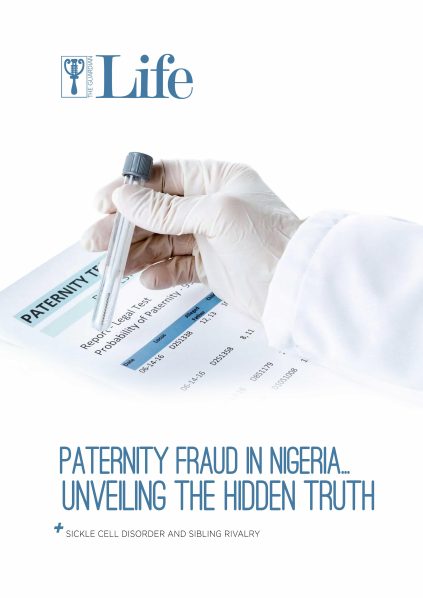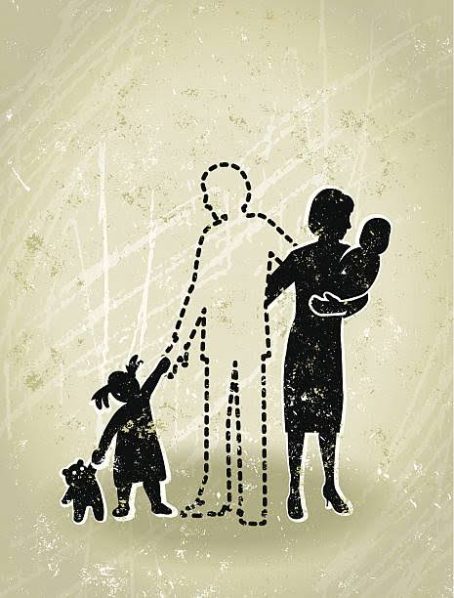
In Nigeria, a country known for its rich culture, vibrant traditions, and close-knit families, there exists a troubling issue that often remains hidden in the shadows – paternity fraud.
This article will shed light on the alarming prevalence of paternity fraud in Nigeria, provide statistics from reputable sources, and explore the emotional and legal consequences faced by both men and children caught in this web of deceit.
What Is Paternity Fraud?
Paternity fraud occurs when a woman falsely claims that a man is the biological father of her child, leading him to believe he has fathered a child when, in fact, he has not.
This deception often stems from various motivations, including financial gain, social status or concealing infidelity. Paternity fraud not only shatters trust within relationships, but also has profound effects on the lives of innocent children.
Keeping family secrets isn’t as easy as it used to be, as Deoxyribonucleic acid (DNA) paternity tests are unraveling a lot of buried family secrets. Just one DNA test could change everything for better or for worse.
Many children are experiencing paternity scandals by learning that their father is really not their biological father.
The perception that paternity fraud is high in Nigeria is not unfounded. Reports have been making the rounds that Nigeria has the second highest rate of paternity fraud in the world after Jamaica.
Many men have been unknowingly raising children that are not theirs and to curb the trend, there have been calls for introduction of mandatory DNA testing at birth
Probably the most common mode of paternity is by acknowledgement. Once a man admits he is the father of a child, the case is closed.
In a recent report, a leading DNA testing centre based in Lagos, Nigeria, released it findings on reasons people seek to test, the demographics of those tested, and the outcomes of the tests.
The result of tests conducted on thousands of users at its facility between July 1, 2022, and June 30, 2023 showed that Lagos accounted for the highest percentage of tests, with 82.89 per cent of the total, followed by Oyo (3.29 per cent), Ogun (3.07 per cent), FCT (2.63 per cent), and Rivers (2.41 per cent).
This heavy concentration in Lagos, particularly, the Mainland (68.14 per cent) compared to the Island (31.86 per cent) owes likely to the location of Smart DNA offices around the purchasing power of the states residents, and the high population density of the state, the report revealed.
On the test type, the report disclosed that the majority of tests (89.10 per cent) were conducted for Peace of Mind, followed by Immigration (8.97 per cent), and Legal (0.64 per cent). This suggests that individuals primarily seek DNA testing to confirm biological relationships for personal reasons rather than legal or immigration purposes, the report averred.
Though paternity fraud is a complex issue in Nigeria, with limited official statistics available, however, a 2016 report published by the Nigerian Tribune stated that approximately 30 per cent of men who took DNA tests in Nigeria to determine paternity discovered they were not the biological fathers of their children. This shocking statistic highlights the widespread nature of this problem.
Furthermore, a study conducted by the Nigerian Institute of Medical Research (NIMR) found that 27 per cent of paternity tests conducted in Lagos State revealed cases of misattributed paternity. These findings indicate a distressing pattern of deceit affecting countless Nigerian families.
Emotional Toll On Men
Discovering that one has been a victim of paternity fraud can be emotionally devastating for men. It shatters their trust, leaving them grappling with feelings of betrayal, anger, and confusion. Many men who believed they were fathers invested emotionally, financially, and socially in the children they later discover are not biologically related to them.
A 2019 report in The Guardian Nigeria, featured the story of Kunle, a 42-year-old man, who had raised a child he believed was his own for over a decade.
After a DNA test revealed the truth, he spoke of the immense pain and sense of loss he felt. Stories such as Kunle’s are all too common in Nigeria, where many men find themselves facing the harsh reality of paternity fraud.
In a surprising turn of events, Nedu, the well-known radio comedian, not long ago, was embroiled in this growing issue that is affecting many lives. This predicament arose in the wake of allegations of domestic violence made against him by his former wife, Uzoamaka Ohiri.
Ms. Ohiri accused Nedu of physically abusing her shortly after she gave birth to their child through a Cesarean section. Nedu responded to these allegations with a startling revelation, stating, “our marriage was plagued with a lot of issues. One of which was continuous infidelity from her side that led to me conducting a paternity test on our kids, which led to the revelation that our first son is not my biological son…”
In a response to Nedu’s claim, Ms. Ohiri expressed her surprise, asserting that she was not aware of the paternity issue until a DNA test was conducted.
She shed light on the origins of this DNA scandal during an interview with Goldmyne, explaining, “I was seeing someone before Nedu; he was pursuing me persistently. I declined his advances after our relationship ended, and that’s when Nedu and I got together.
“Along the line, I discovered I was pregnant. Trust me, if I knew that my first child was not his, I wouldn’t have married him. I couldn’t intentionally pass another man’s child as his own. If I had known, I wouldn’t have walked down the aisle with him. On my wedding day, I was pregnant, and everyone saw it.”
Furthermore, Ms. Ohiri, a mother of three, maintained that she had been faithful during her marriage and questioned Nedu’s claim to her son’s custody.
This unfolding drama not only highlights the complexities of personal relationships, but also raises significant concerns about the impact of such revelations on children.
Implications On The Child(Ren)
While paternity fraud primarily affects men, the children caught in the midst of such deception also suffer immensely. These innocent children are often left in a state of confusion, as they come to terms with the fact that the man they believed to be their father is not biologically related to them.
This revelation can lead to identity crises, emotional trauma, and strained family relationships. The child may feel abandoned or unloved, which can have long-lasting psychological effects. Addressing the needs and emotions of these children is crucial in mitigating the harm caused by paternity fraud.
Children who discover that their biological parent is different from the one they believed can experience emotional distress and confusion. This revelation can lead to identity crises, feelings of betrayal, and a sense of insecurity.
Paternity fraud can result in the breakdown of families. If the biological father decides to leave or disengage from the child’s life upon discovering the truth, it can lead to single-parent households or complicated family dynamics.
In some cases, legal battles over paternity can arise, leading to financial strain on families. This may involve child support or custody disputes, which can be emotionally taxing for both parents and children.
Children who are victims of paternity fraud may face social stigma or discrimination from peers and society. This can affect their self-esteem and social relationships.
Accurate knowledge of one’s biological parentage is essential for medical history and genetic health concerns. Paternity fraud can hinder access to vital health information and appropriate medical care.
Children who have experienced paternity fraud may develop trust issues in their future relationships, impacting their ability to form healthy, trusting bonds.
The emotional turmoil caused by paternity fraud can affect a child’s concentration and performance in school, potentially leading to academic challenges.
To address the impact of paternity fraud on children, it is essential to promote transparency and honesty within families. Legal and societal support systems must also be in place to ensure that children’s rights and well-being are protected in such situations.
While specific statistics on paternity fraud in Nigeria may be limited, the broader implications underscore the importance of maintaining trust and open communication within families to prevent and address such issues. Additionally, legal frameworks should be equipped to handle cases related to paternity disputes while prioritising the best interests of the child.
Legal Implications
In Nigeria, the legal ramifications of paternity fraud remain a complex issue. While some men seek legal recourse to recover financial contributions made to support children they later discover are not biologically theirs, the legal system often lacks clear guidelines and precedents for such cases.
The Nigerian legal framework does not specifically address paternity fraud, making it challenging for victims to seek justice. Consequently, some men opt for out-of-court settlements, while others find themselves in protracted legal battles with no clear resolution.

The Way Forward
To effectively tackle the issue of paternity fraud in Nigeria, a multi-faceted approach is necessary. The following are some key steps that can be taken to combat this problem:
Public Awareness: It is vital to create awareness about paternity fraud through educational campaigns, media, and other public discussions. People need to understand the emotional and societal consequences of this deceitful practice.
Legal Reforms: The Nigerian legal legislature should consider enacting laws specifically addressing paternity fraud to provide clearer guidelines for victims seeking redress.
Access To DNA Testing: Promoting access to affordable and accurate DNA testing facilities can help individuals confirm paternity with ease. This would empower men to seek the truth without facing financial constraints.
Support For Children: Adequate psychological and emotional support systems should be in place to assist children who are affected by paternity fraud. This will ensure that they receive the necessary care and attention to help them cope with the situation.
[ad unit=2]








